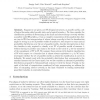Free Online Productivity Tools
i2Speak
i2Symbol
i2OCR
iTex2Img
iWeb2Print
iWeb2Shot
i2Type
iPdf2Split
iPdf2Merge
i2Bopomofo
i2Arabic
i2Style
i2Image
i2PDF
iLatex2Rtf
Sci2ools
109
click to vote
TCS
2008
2008
Absolute versus probabilistic classification in a logical setting
Suppose we are given a set W of logical structures, or possible worlds, a set of logical formulas called possible data and a logical formula . We then consider the classification problem of determining in the limit and almost always correctly whether a possible world M satisfies , from a complete enumeration of the possible data that are true in M. One interpretation of almost always correctly is that the classification might be wrong on a set of possible worlds of measure 0, with respect to some natural probability distribution over the set of possible worlds. Another interpretation is that the classifier is only required to classify a set W of possible worlds of measure 1, without having to produce any claim in the limit on the truth of for the members of the complement of W in W. We compare these notions with absolute classification of W with respect to a formula that is almost always equivalent to in W, hence investigate whether the set of possible worlds on which the classificat...
| Added | 15 Dec 2010 |
| Updated | 15 Dec 2010 |
| Type | Journal |
| Year | 2008 |
| Where | TCS |
| Authors | Sanjay Jain, Eric Martin, Frank Stephan |
Comments (0)

